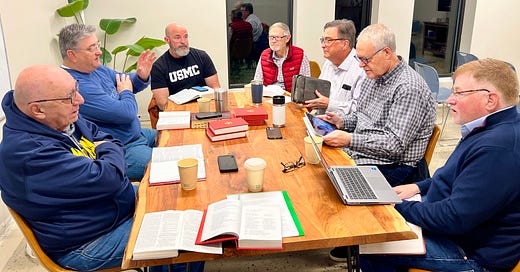Why small groups are the heartbeat of spiritual growth
Inside the men’s Bible study at Good Shepherd Anglican Church.
As a passionate advocate for small groups, I’d like to introduce you to one of the three groups I have the privilege of leading each week.
The photo above captures the heart of our men’s Bible study at Good Shepherd Anglican Church in Cornelius, North Carolina.
Every Tuesday morning, six to 12 of us gather at 6:30 a.m. It’s early, but it’s a good time for these men to dive into God’s Word, share fellowship, and pray before heading off to work by 7:30 a.m.
My day starts at 5:45 a.m., brewing coffee and setting up the meeting room. By 6 a.m., Mark Montalbano (sporting his trusty USMC shirt above) arrives, ready to chat about church happenings and current events. Frank Guth (far left in the photo) joins the conversation about 10 minutes later, keeping things lively before the rest of the group arrives.
We begin our study by reciting The Apostles’ Creed.
Saying, “I believe in God, the Father almighty” … “I believe in Jesus Christ, his only Son” … “I believe in the Holy Spirit” is a powerful reminder of the truths we hold dear.
But as a group, we’re also declaring, “WE believe” — a shared affirmation of our faith that binds us together.
The next hour is dedicated to digging into Scripture — asking hard questions, sharing laughter, and supporting one another through the unique challenges each man is facing.
I prepare the study each week, emailing notes, background on the passage, and thought-provoking questions to the group over the weekend.
Recently, we wrapped up a nine-month study of Revelation, and now we’ve turned to 1 Timothy, where the apostle Paul lays out guidance for church leadership and sound doctrine.
This week, we explored 1 Timothy 3:1–13, discussing the qualifications for pastors and deacons — an especially timely study as Good Shepherd continues its search for a new lead pastor.
Here’s what I said in my opening Tuesday:
“Church leadership matters deeply to every believer. Strong, passionate leaders strengthen the church and advance the Gospel, while poor leadership can cause spiritual harm or even turn people away from Christ. Paul’s instructions in 1 Timothy 3:1–13 remind us of the importance of godly leadership for the church’s mission and witness.
“Church leadership is designed by God. It is not man’s invention, so we must avoid imposing our own leadership structure on God’s design. We also must keep in mind that Jesus is our leader and that people are qualified to lead only insofar as Jesus is living and working within them.”
We discussed the four main responsibilities of pastors:
They are entrusted by Christ with the responsibility of overall leadership in the church.
They care for the body of Christ. They are on the front line of spiritual warfare, acting as a shepherd to protect the church from false teachers and other evil things.
They are to teach the Word of Christ. We don’t follow pastors simply because they have a position. We follow them because they know the Word, teach the Word, and follow the Word.
They are to model the character of Christ.
Why small groups are important
Here’s why small groups like this matter so much:
Each man in our Bible study attends church weekly and spends time in personal study at home. But something powerful happens when we gather together as a small cohort.
The Scripture truly comes alive as we wrestle with the text together, share insights, and explore how it connects to our everyday lives.
We challenge one another with hard questions, uncovering deeper truths and refining our beliefs. We share real-life examples of how God’s Word shapes and transforms us.
It’s in these moments — face-to-face — that we experience the richness of Christian community. Only when we gather with others can we fully reap those rewards.





